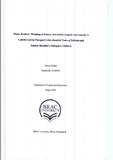| dc.contributor.advisor | Azim, Firdous | |
| dc.contributor.author | Sultana, Salma | |
| dc.date.accessioned | 2010-09-22T04:58:26Z | |
| dc.date.available | 2010-09-22T04:58:26Z | |
| dc.date.copyright | 2009 | |
| dc.date.issued | 2009-08 | |
| dc.identifier.other | ID 05303015 | |
| dc.identifier.uri | http://hdl.handle.net/10361/178 | |
| dc.description | This thesis is submitted in a partial fulfillment of the requirements for the degree of Bachelor of Arts in English, 2009. | en_US |
| dc.description | Cataloged from PDF version of thesis. | |
| dc.description | Includes bibliographical references (page 77-79). | |
| dc.description.abstract | Stories are always fascinating to every walk of life, but stories with magical or fantastical elements with of fairies or ghosts always amuse people. However, being a student of literature, I got an opportunity to look beyond this contemporary vision of magic realism. In postmodern literature, the attribution of magic realism is used to express the historical, cultural and ideological domination of the postcolonial regimes by its dictators. Therefore, in this dissertation I will discuss how all the magical elements are used by different postcolonial writers such as Marquez and Rushdie to express their postcolonial position in conjunction with the postmodern condition | en_US |
| dc.description.statementofresponsibility | Salma Sultana | |
| dc.language.iso | en | en_US |
| dc.publisher | BRAC University | en_US |
| dc.rights | BRAC University thesis reports are protected by copyright. They may be viewed from this source for any purpose, but reproduction or distribution in any format is prohibited without written permission. | |
| dc.subject | English and humanities | |
| dc.title | Magic realism: Mingling of fantasy and reality, tragedy and comedy in Gabriel Garcia Marquez's one hundred years of solitude and Salman Rushdie's Midnight's children | en_US |
| dc.type | Thesis | en_US |
| dc.contributor.department | Department of English and Humanities, BRAC University | |
| dc.description.degree | B.A. in English | |

